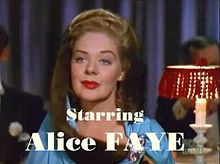Alice Faye
By this time, Faye had adopted her stage name and first reached a radio audience on Rudy Vallée's The Fleischmann's Yeast Hour.
[3] Faye received a physical makeover, going from a version of Jean Harlow to a wholesome appearance, in which her platinum hair and pencil-line eyebrows were swapped for a more natural look.
The film contained a 20-minute finale, a recreation of the Great Chicago Fire, a scene so dangerous that women, except for the main stars, were banned from the set.
Although a big hit, the film was supposedly based on the real life of comedian Fanny Brice, who sued Fox for stealing her story.
Due to her immense popularity, though, none of the films that she made in the 1930s and 1940s lost money; this success garnered her the nickname "Queen of Fox".
[citation needed] After declining the lead role in for Down Argentine Way (also 1940) because of an illness, Faye was replaced by the studio's newest musical star, Betty Grable.
In a Biography interview, Faye disclosed that the Fox publicity department built up the rumor, and that the two actresses were in fact close friends.
Films such as Week-End in Havana (1941) and That Night in Rio (1941), in which she played a Brazilian aristocrat, made good use of Faye's husky singing voice, solid comic timing, and flair for carrying off the era's starry-eyed romantic story lines.
[citation needed] As Faye's star continued to ascend during the war years, family life became more important to her, especially with the arrival of a second daughter, Phyllis.
[7] When Faye saw a screening of the final cut—with her role reduced by 12 scenes and a song number—she wrote a scathing note to Zanuck, went straight to her car, gave her dressing room keys to the studio gate guard, and drove home, vowing never to return to Fox.
Zanuck hit back by having her blackballed for breach of contract, effectively ending her film career, although Faye no longer cared to pursue it.
[citation needed] Faye's first marriage, to Tony Martin in 1937, ended in divorce in 1940; both had busy careers that made it difficult for them to have opportunities for togetherness.
Their marriage, one of the most successful in Hollywood, became a plotline in the hit radio comedy, The Jack Benny Program, where for 16 years Harris was a regular cast member.
Harris's comic talent was already familiar through his tenure on Jack Benny's radio shows for Jell-O and Lucky Strike.
With their own show revamped to a sitcom, bandleader-comedian Harris and singer-actress Faye played themselves, raising two precocious children in slightly zany situations, mostly involving Harris's band guitarist Frank Remley (Elliott Lewis), obnoxious delivery boy Julius Abruzzio (Walter Tetley, familiar as nephew Leroy on The Great Gildersleeve), Robert North as Faye's fictitious deadbeat brother, Willie, and sponsor's representative Mr. Scott (Gale Gordon), and usually involving bumbling, malaproping Harris needing to be rescued by Faye.
Faye's singing ballads and swing numbers in her honeyed contralto voice was a regular highlight of the show, as was her knack for tart one-liners equal to those of her husband.
The show's running gags also included references to Alice's wealth from her film career ("I'm only trying to protect the wife of the money I love" was a typical Harris drollery), and occasional barbs by Faye aimed at her rift with Zanuck, usually referencing Fallen Angel.
In 1974, Faye made a return to Broadway after 43 years in a revival of Good News, with her old Fox partner John Payne (who was replaced by Gene Nelson).
[citation needed] Three years after Phil Harris's death, Alice Faye died of stomach cancer in Rancho Mirage, California, four days after her 83rd birthday.
She was cremated and her ashes rest beside those of Phil Harris at the mausoleum of the Forest Lawn Cemetery (Cathedral City) near Palm Springs, California.
[1] During her years as a musical superstar (from the 1930s to the early 1940s), Alice Faye managed to introduce 23 songs to the Hit Parade.




